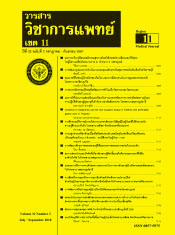Cognitive Stimulation with Mild Cognitive Impairment in People
Keywords:
Lognitire status, cognitiow stimulation, mild cognitive impairment, dementionAbstract
This quasi-experimental design study aimed to investigate the effect of cognitive stimulation with mild cognitive impairment in people. The sample consisted of 30 people aged over 50 years who lived in Mueang District, Surat Thani Province, and met the inclusion criteria. Simple random sampling technique was used to draw the control group and the experimental group from the sub-districts. Both groups had similar characteristics of gender, age, education level, and cognitive score. The experimental group received the cognitive stimulation program. Data collection was conducted using cognitive assessment. Data analysis was done using descriptive statistics and repeated measures ANOVA.The results showed that, at the 3-month post-intervention and the 6 and 9-month follow-up, the experimental group had a higher cognitive score than prior to the intervention and had a higher mean score of cognitive status than the control group. In the control group, the mean score of cognitive status increased at the 3-month post-intervention but decreased at the 6 and 9-month follow-up. The experimental group had different scores of cognitive status pre- and post-intervention at the 3, 6 and 9-month follow-up with statistical significance (p<.05). The control group had different scores of cognitive status with no statistical significance (p>.05).The cognitive stimulation program with mild cognitive
impairment can be implemented on adults and older adults to reduce the risk of future dementia.
References
สามารถ นิธินันท์. การศึกษาความชุกของภาวะสมองเสื่อมในประเทศไทย. เวชสารแพทย์ทหารบก; 2540; 50:189-196.
มาโนช ทับมณี.ความซึมเศร้าและภาวะสมองเสื่อมในผู้สูงอายุในชุมชนเขตกรุงเทพมหานคร.วารสารจิตวิทยาคลินิก; 2544;32:43-57.
Jitapunkul, S., Kunansout, C., & Suriya-wongpaisal,W. Prevalence estimation of dementia among Thai elderly: a
national survey.J Med Assoc Thai; 2001;84:461-467.
พนิดา กฤตยภูษิตพจน์ และคณะ. รายงานผลการดำเนินงานภาวะสมองเสื่อมจังหวัดสุราษฎร์ธานี “ไม่ได้ตีพิมพ์”; 2546.
Olazaran, J. Mild cognitive i mpairment and dementia in primary care: the value of medical history. Family Practice; 2011;28:385-392.
สุทธินันท์ สุปันตี, วรรณภา ศรีธัญรัตน์.ภาวการณ์รู้คิดบกพร่องในผู้สูงอายุเจ็บป่วยเรื้อรังที่มารับบริการคลินิกโรคเรื้อรังของหน่วย
บริการปฐมภูมิแห่งหนึ่งในจังหวัดขอนแก่น.วารสารพยาบาลศาสตร์และสุขภาพ;2557;37:43-50.
สถาบันเวชศาสตร์สมเด็จพระสังฆราชญาณสังวรเพื่อผู้สูงอายุ. รายงานการวิจัยการพัฒนาศักยภาพสมองของผู้ที่มีสมรรถภาพสมองบกพร่องในระยะต้น พ.ศ. 2557-2558.นนทบุรี: กระทรวงสาธารณสุข;2559.
Wilson, R., Scherr, P., Scheider, J., et al.Relation of cognitive activity to risk of developing Alzheimer disease. Neurology;2007;69:1991-1920.
ดาวชมพู นาคะวิโร, สิรินทร ฉันศิริกาญจน,พัฒน์ศรี ศ รีสุวรรณ, อรพรรณ แอบไธสง,ภัทรา สุดสาคร, จารุณี วิทยาจักษุ์ และ ภัทรพร วิสาจันทร์. การกระตุ้นความสามารถของสมองด้านทักษะการจัดการความใส่ใจ ความจำและมิติสัมพัทธ์ในผู้ที่มีสมรรถภาพสมองบกพร่องระยะต้น.วารสารสมาคมจิตแพทย์แห่งประเทศไทย;2560;62:337-348.
Polit, D., & Hungler, B. Nursing Research Principles and Methods. 6th. Philadelphia:Lippincott Williams & Wilkins;1999.
Hemrungrojn, S. Montreal cognitive assessment (MoCA). (online) 2011.Available from https://www.mocatest.org/pdf_file/test/MoCA-test-thai-pdf.(Cited 2017 Aug 12).
Wenisch, E., Cantegreil-Kallen, I., De Rotrou, J., Moulin, F., Batouche, F. ,Richard,et al. Cognitive stimulation
intervention for elders with mild cognitive impairment compared with normal ages subjects: preliminary results.
Aging Clin Exp Res; 2007;19:316-22.
ปิ่นมณี สุวรรณโมสิ, จิราพร เกศพิชญวัฒนา ผลโปรแกรมกระตุ้นการรู้คิดต่อความจำของผู้สูงอายุในชุมชนที่มีการรู้คิดบกพร่อง.
วารสารพยาบาลตำรวจ; 2559;8:45-57.
Verghes J, Lipton RB, Katz MJ, et al.Leisure Activities and the Risk of Dementia in the Elderly. N Engl J Med
; 2003;348:2508-16






